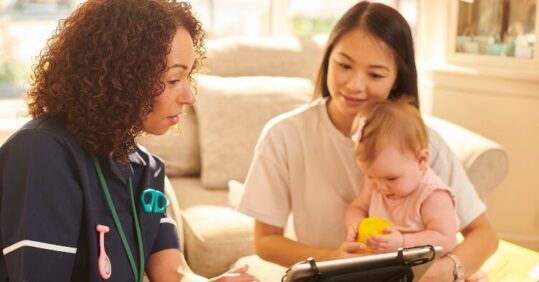Health visitors report poverty rise amid calls for closer GP ties

Poverty is currently the cause of ‘greatest concern’ for health visitors, research has revealed, with some reporting the situation is now so widespread it has become ‘the norm’.
Capacity problems among the workforce have also been highlighted, with closer GP alignment put forward as one of the potential solutions.
According to a survey by the Institute of Health Visiting (iHV), 93% of health visitors have witnessed an increase in the number of families affected by poverty in the last 12 months.
The iHV’s State of Health Visiting, UK Survey Report, published today, also found that 89% of health visitors have seen a rise in the use of food banks, while 50% witnessed an increase in families skipping meals as a result of the cost-of-living crisis.
Related Article: England’s CNO to launch nursing strategy ‘later this year’
A 78% increase in perinatal mental illness was also reported, along with a 69% rise in domestic abuse.
According to the iHV, there is a national shortage of around 5,000 health visitors in England.
The survey found that 79% of health visitors believe the service lacks capacity to offer a package of support to all children identified with needs, and only 45% were ‘confident’ or ‘very confident’ that their service was able to meet the needs of vulnerable babies and children when a need is identified.
In addition, 80% said that other services were also stretched and lacked capacity to pick up onward referrals for children with additional needs.
The iHV has made several recommendations in the report, including closer alignment of health visiting with general practice.
A House of Lords select committee recently reported that health visitors are ‘progressively being separated from general practice’ and called for an exploration of different ownership models for GP practices to ‘facilitate more joined-up and better care’.
One respondent to the iHV survey urged: ‘Go back to GP alignment. The corporate caseload has made health visitors less autonomous, not using their initiative or showing flexibility.’
The iHV also advocated ‘building services around the needs of families’, with accessible support including the reinstatement of health visitor drop-in clinics and increased home visiting, along with closer GP alignment.
Related Article: More nursing apprenticeships and changes to student travel expenses
Alison Morton, chief executive at the iHV, said: ‘When sufficiently resourced, health visitors can take pressure off busy A&E departments and GPs, providing support for families in the heart of the community.’
She added: ‘The costs to rebuild the health visiting service in England are small compared to the spiralling costs of NHS treatment, child maltreatment and cumulative costs across the life course.
‘Investing in our children’s health is not only the right thing to do, it also makes sound economic sense.
The iHV’s annual survey was completed by 1,186 practitioners from across the UK between 2 October and 6 November 2023.
Related Article: Nurses given ‘range of leadership opportunities’ in NHS 10-year plan
A government spokesperson said: ‘Children are five times more likely to experience poverty when living in a home where no-one works, which is why this government has reduced the number of workless households by 700,000 since 2010.
‘We continue to help families with the cost of living with support worth on average £3,700 per household, including raising benefits by 6.5% from April and increasing the Local Housing Allowance.’
They added: ‘We plan to increase health visitor training places and have provided local authorities £3bn to fund health services to make sure children get the best start they need.’

See how our symptom tool can help you make better sense of patient presentations
Click here to search a symptom




